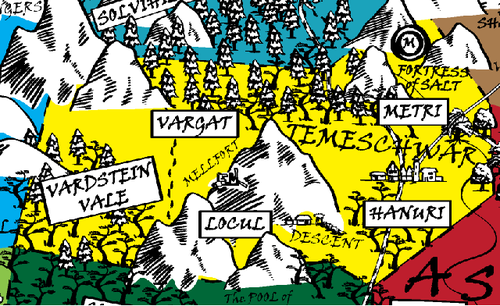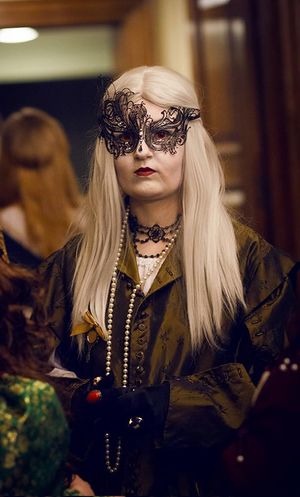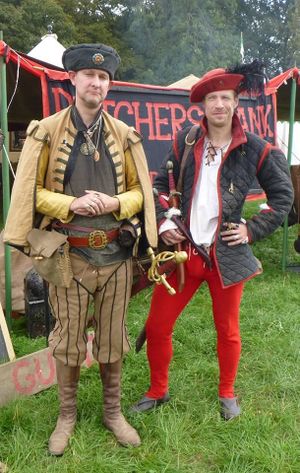Temeschwar
Overview
Temeschwar was once part of wild Varushka, but it joined the Empire alongside Sarvos and Tassato, when the League was formed. Citizens of Temeschwar commonly make an effort to be as flamboyant as their southern fellows, but their dress is inevitably more practical, to accommodate the harsh northern weather. They are traditionally more brutally pragmatic than those who live on the bay. It is a foothold of trade to Varushka, Wintermark and nearby Dawn. Trading in raw materials and crafted goods, especially weapons and armour, it is seen by many as the merchant capital of the northern lands.
Despite its good relations with Varushka, Temeschwar has always suffered somewhat from being distant from Sarvos and Tassato whose close proximity made them the natural heart of the League. Temeschwar may well be the richest of all the cities of the League, but it can never quite shake the fear that it is not as good as the others. This anxiety is just part of what drives the Temeschwari to be so competitive and so ruthless. Temeschwari strive to work that bit longer and that bit harder than anyone else in the League. If a Sarvossian closes their shop at sunset, their Temeschwari neighbour will light a pair of lanterns and keep trading for another hour.
Not all relations with Varushka are good, however. There is still some bad blood between those of old Varushkan stock in Temeschwar and the citizens of Delev in Karov. When Temeschwar joined the Empire it attempted to prove that it had legitimate ownership of the Eternal Shafts of Time, a rich mithril mine on the border between the two territories. There are still plays and theatrical adaptations that revolve around the underhand, ruthless way the boyar of Delev "stole" the mine from under the noses of the Temeschwari, and relations between some Delev traders and some citizens of Temeschwar are chilly to this day - especially in the rare cases where there is some distant blood connection between the two.
The Temeschwari are not just the most competitive people in the League, they also have a well deserved reputation as the most ruthless. In the years before the creation of the Empire, the city was plagued by gangs of thieves and assassins who operated with open impunity despite the best efforts of the boyar, Ratibor. Thousands of inhabitants were linked with the different gangs who used tattoos to mark membership and enforce loyalty.
In the end Ratibor hired a force of Varushkan mercenaries and brought them in secret into the city during the depths of winter. In the notorious night of a thousand torches (named for the torches the soldiers carried to light their way) every inhabitant of the city was turned out of their beds, stripped and searched for marks. Anyone with a tattoo on their body was given a few minutes to collect their belongings before being forced from the city into the frozen snows beyond the walls. A few managed to bribe their way past the search but most were given over to the winter and were never seen again. The act was one of monstrous brutality, but it established the power of Ratibor as boyar and broke the power of the criminal gangs forever.
The Temeschwari wear their reputation for cold, hard dealing with pride. They view themselves as the strongest people in the League, combining the ambition and drive of the south with the strength and determination of the north. Physical as well as mental strength is prized here - Temeschwari bravos are as likely to favour the axe as the rapier - and her free companies have a reputation for toughness, as soldiers and as people. Most Temeschwari free companies are careful not to break the rules for they know the magistrates watch them carefully - but they will do almost anything required to win short of this. You can find many things in Temeschwar, it is said, but you will not find a scruple though you search the city from sunrise to sunset.
Recent History
Rumours suggest that the vyig criminal organisation has become active again in the northern city. This Varushkan criminal fraternity is untied by an absolute hatred of Imperial law, and once threatened to overtake both Temeschwar and the League. Becoming increasingly bold, their activities lead to a major operation supported by the Synod to once again drive these criminals out of the northernmost League city - and indeed the League as a whole.
Shortly before the Winter Solstice 381YE, the Blood Red Roads were completed, with Temeschwar as a major hub. They providing merchants and traders from across the Empire with easy access to the markets of Temeschwar, and vice versa. For more than half a decade the roads provided a major boon to the farms and businesses of the territory. In the Winter of 386YE, however, the Imperial Senate determined to levy tolls on traffic using the road, meaning they no longer increase the income of individual citizens but provide a significant boost to the Imperial Treasury, in part to pay for the war against the vallorn.
Major Features
Temeschwar
The city of Temeschwar occupies most of Hanuri. It is also the site of the Northern Traders Guild (which forms the southern arm of the Northern trade network. The Tomb of Empress Giselle was built here in Winter 380YE, and Temeschwar is also the site of the Bloody Great Theatre, a theatrical venue that is also a site of pilgrimage for League citizens interested in exploring their Proud history of the dour city. In Winter 381YE, a branch of the Tassato Mana Exchange - the Temeschwar Mana Exchange - was built on the eastern side of one of the cities' largest and oldest meat markets. Until Spring 383YE, it was the site of a statue dedicated to the eternal Janon. The statue was reduced to expensive rubble by a band of Varushkan wardens apparently inspired to action by the Council of Nine.
Northernmost of the four great cities of the League, Temeschwar was one of the three founding cities. It is very different in style to Sarvos and Tassato, and its origins as a Varushkan trade town are obvious in the architecture of its many old buildings. Structures are built to last in Temeschwar, with stone being a much more popular building material than wood, and with slate roofs more common than thatch. The city is extremely cold during the Winter (and during late Autumn and early Spring most years), and snowfall is a regular problem not faced by the inhabitants of more southerly cities of the League.
The people have a well deserved reputation for competitiveness, and for ruthlessness. Temeschwar may well be the richest of all the cities of the League, but it can never quite shake the fear that it is not as good as the others. This anxiety is just part of what drives the Temeschwari to be so competitive and so ruthless. Temeschwari strive to work that bit longer and that bit harder than anyone else in the League. If a Sarvossian closes their shop at sunset, their Temeschwari neighbour will light a pair of lanterns and keep trading for another hour.
The Walls of Temeschwar
The city proper is surrounded by great white granite walls. While not on the scale of the walls of Holberg in the east, they have proved more than sufficient to protect the city from its enemies. Nine great towers are placed roughly equidistant around the walls, seven named for each of the Virtues and two (those that incorporate the gates through which the Gancio enters and leaves the city) called the Northern and Southern Rivergates. Each is equipped with a great iron bell, used to toll the hours, and to warn of potential dangers. In cases of fire, for example, the bell in the tower nearest the blaze is sounded repeatedly until the flames are extinguished.
Temeschwar has grown since the walls were built, of course, and there are nearly as many buildings outside the walls as there are within them. In times of emergency, however, the population can take refuge within the walls - although how long Temeschwar could survive an actual siege remains to be seen.
The Bloody Great Theatre
The Bloody Great Theatre is one of the most prominent theatres in the Empire. It was commissioned by Gant Archama and approved by the Senate in Winter 380YE, in the wake of a powerful surge of interest in the arts. A small movement to have the building officially named "Grand Temschwari Theatre" gained very little traction - the amusement of calling such a large and impressive structure by such a common name has meant it has largely stuck. It serves as an inspiration, and a source of Pride, for the citizens of the city.
The Great Game
Commissioned by the Senate in Spring 382YE, and completed a little over a month later, the Great Game was paid for by Lorenzo "la Volpe" Macelliao von Temeschwar and built by Almodin Oktístis, the Asavean architect. It is a grand casino that also contains numerous places of refreshment and hostelries that stands beside the Blood Red Road outside the southern walls of the city proper.
The Fortress of Salt
The Fortress of Salt is a Bourse resource located in Metri. Custodianship of the Fortress is an Imperial Title that brings with it a Seat on the Bourse. It produces 25 Imperial wains of mithril every season. Control is allocated to any Imperial citizen by open auction during the Autumn Equinox.
Lorenzo's Legacy of Loyalty
Spread across the entire territory of Temeschwar are a number of red stone stelae. A central stone, the keystone for the entire great work, stands in front of the Butcher's Guild in the city itself. The legacy guides and focuses the flows of mana through the territory, increasing the amount of crystal mana produced by sites across Temeschwar.
Mellfort
In Locul, on the higher slopes of Mellfort Peak, stands old Mellfort. This ancient hillfort consists of a ruined set of concentric rings of black stone, believed to have been of Terunael origin (although some scholars claim the Terun simply adapted a much older structure, perhaps one built by The Sentinel). The fort was in ruins when the first Varushkan settlers came here, believed to be a casualty of the wars between the people of Terunael and the orcs. Human settlers lost no time in incorporating the sturdy stones of the ruin into their own fortification.
The fortification here was decommissioned during the reign of Empress Mariika, during a compromise which saw funds channelled to the fortification of Temeschwar itself. Following the fall of Skarsind there was discussion of rebuilding it as a watchpost and beacon. In early 377YE the fortress was partially refitted to serve as a base of operation for groups of bravos hunting bandits and brigands preying on Temeschwari trade. Overseen by Bridget Eastville (senator for Mitwold) as part of a larger plan to provide protection to towns throughout the Empire, the defences were not sufficient to qualify Mellfort as a fortification. Still, they helped reduce outlawry throughout the territory and led to further discussion about completing the work and restoring Mellfort to its former glory as a strategically placed fortification.
Throughout its history, people who have spent long periods of time here have reported strange dreams - dreams of sadness, loss and bittersweet remembrance. Unlike many such 'accursed places' it gained a reputation for strangeness, rather than terror or fear, and in the early years of the Empire became something of a place of pilgrimage for those suffering grief or regret. Interest in the strange aura here culminated in Winter 383YE with proposals as to how to make the best use of it. The Senate ultimately approved the plan of the Emerald Magpie Guild to turn Mellfort into a place to rest and recuperate, establishing the Reaper's Repose. The existing structures - the palisades and the watchpost - were incorporated into the new structure, and consequently Mellfort is no longer even lightly fortified.
Lorenzo's Deep Pockets
Just over a month after the Spring Equinox 381YE a large section of north-western Goldglades in Miaren collapsed with an almighty roar. After the initial collapse, the hole began to spread. Warnings by the Navarr vates reached the already-worried people of the Vardstein Vale not a moment too soon. Parts of that region soon followed north-western Goldglades into the spreading hole. Thanks to the Navarr, the few settlements here were all evacuated in time to avoid major loss of life although the disruption caused significant losses to those invested in the forests of the south-western territory.
Where Temeschwar once bordered Upwold, there is now a massive sinkhole. Estimated to be seven hundred feet deep, with a lake at the bottom that may well be bottomless. The cliff walls are nearly vertical and still prone to collapse in some places, but there are also signs of caves and tunnels opening out in several places. Initial explorers have excitedly reported what look to be ancient mine workings - some reaching back to the time of the Terunael, and some reaching back even further. The full extent of the network of caverns here has yet to be determined. More worryingly, some of the early daredevils who have made a preliminary investigation of some of the more accessible caves and tunnels have failed to return - and all those who have made it back in one piece have described encounters with particularly angry trogoni - creatures rarely encountered outside of the mountains of Urizen, and the northern peaks of Wintermark and Varushka.
The sinkhole was officially named "Lorenzo's Deep Pockets" by Lorenzo Macelliao von Temeschwar, but is sometimes known smirkingly as "The Foxhole" or (rather more lewdly) as "La Volpe's Arse".
Regions
Hanuri
- Qualities: City, Fortification
The main feature of Hanuri is the city of Temeschwar itself.
Locul
- Quality: Hills
Much of the territory of Temeschwar is rugged and hilly, but in Locul the foothills rise steeply into the heights of Mellfort Peak which took its name from the hill fort built on the upper slopes. These ruins were ultimately repurposed to create the prestigious Reaper's Repose, a premiere location for exhausted merchant-princes to rest and recuperate away from the pressures of city life.
Before the forerunners of the League restored the ruins there, the peak was called Suyan. The mountain dwarfs the surrounding territory, for all that Urizen visitors like to claim (somewhat smugly) that it is not a real mountain. The peaks and foothills of Locul are the site of many prosperous mines, especially those working green iron and weltsilver. One of the best known of these mines is Descent - a mining village built around a large open sinkhole at the foot of Mellfort Peak. Many years ago a stairs and ramp were built spiralling down into the depths of the Descent, and green iron is mined from an extensive cavern complex beneath. The Custodian of the Assayer's Guild often spends a lot of time surveying the mines of Locul, when they are not at their offices in Temeschwar proper.
Metri
The Fortress of Salt is found in Metri, very close to the border with Varushkan Karov. During Winter 380YE, something unnatural settled into the woods here, that brought with it both a peculiar magical effect and a strange sense of safety. Gaunt spirits, ghosts, and a general sense of mild unease permeated the place but the roads were unmolested by bandits and beast alike. Anything or anyone that tried to bring violence against another person in Metri suffers bloody, unnatural judgement at the claws and teeth of alien creatures that haunted the region. Just before the Winter Solstice 384YE it was uncovered that the place was home to a number of heralds of the Hag Queen. During the Winter Solstice 384YE the Order of the Rod and Shield were instructed to go and clear out these heralds - removing the haunted nature of the region - which led to a showdown between the Grand Enchantrix and the Grandmaster of the Rod and Shield, Sakari Nightscale.
Vargat
A somewhat hilly region, dotted with villages and scattered areas of cultivated woodlands. Vargat is perhaps best known for the brewing of strong spirits, the good quality, thick-crusted dark rye-bread made from locally sourced flour known colloquially a Vargat Bianch, and for extremely strong-tasting pickled cabbage that is considered a local delicacy by those from Vargat, and a challenge to the digestive system and sense of taste by everyone else. Increased trade with southern nations, especially the Freeborn, has seen a recent fashion in Vargat for vegetable dishes prepared by fermenting with a variety of seasonings. It remains to be seen if this culinary fashion will become popular in the League.
Vardstein Vale
- Quality: Forest
The southern Vardstein Vale that slopes down toward Miaren has a reputation for wildness. While the periphery has been cultivated with a number of small woodland preserves, most of the woodland is left "wild". The forest is known to be home to many wolves, and to at least one pack of wily dire wolves. The decision to leave the Vale as a hunting preserve has caused occasional friction with the Navarr and Wintermark who point out that wild beasts do not respect borders. More artistically minded individuals point to the decision to leave the Vardstein Vale "wild" as reflecting a key element of the Temeschwari (and indeed League) soul. They are civilised, but they are not tame ...
| Summit | Elected |
|---|---|
| Winter Solstice 386YE | Giuseppe Sanguineo von Temeschwar |
| Winter Solstice 385YE | Giuseppe Sanguineo von Temeschwar |
| Winter Solstice 384YE | Giuseppe Sanguineo von Temeschwar |
| Winter Solstice 383YE | Giuseppe Sanguineo von Temeschwar |
| Winter Solstice 382YE | Giuseppe Sanguineo von Temeschwar |
| Summer Solstice 382YE | Giuseppe Sanguineo von Temeschwar |
| Winter Solstice 380YE | Gant Archama |
| Winter Solstice 379YE | Gant Archama |
| Winter Solstice 378YE | Gant Archama |
| Winter Solstice 377YE | Drogon Morosini |
| Winter Solstice 376YE | Oksana Kazaku von Temeschwar |
Recent Senate Elections
As an Imperial territory, Temeschwar is represented by a senator elected in the Winter. This title is currently held by Giuseppe Sanguineo von Temeschwar; it will be reelected at the next summit. The table to the right shows the citizens who have been elected to hold this title in the years since Empress Britta died.
OOC Notes
- All the regions of Temeschwar are in the hands of the League (and by extension the Empire) making it a staunchly Imperial territory.
- The city walls are a rank two fortification.
- Businesses in the territory benefit from both the Great Game and produce an extra 36 rings each season.
- Congregations in the territory benefit from the Bloody Great Theatre and produce an extra 2 doses of liao each season.
- Mana sites in the territory no longer benefit from the Lorenzo's Legacy of Loyalty following a senate motion to divert production to Spiral.
- Due to the presence of the sinkhole in the Vardstein Vale it is not possible for a campaign army to move directly between Temeschwar and Upwold despite their apparent proximity on the map.



